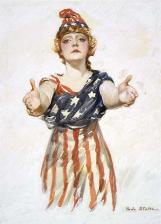If you are lucky enough to own a boat, is it a “she”? Have you given your car a girl’s name or a boy’s name? Do you refer to the place you’re from as your motherland or as your fatherland? The tendency to use female names and pronouns to refer to nonliving things such as ships and cars is an example of personification, giving human characteristics to nonhuman things. There are a few exceptions, though. Not all boat and car owners choose female names for their vehicles, and some nations tend to be “male.” Join us as we take a little voyage to various places on various modes of transportation.
Female Pronouns for Objects
Both hardcover (1) and online dictionaries agree: The pronoun “she” can refer to inanimate objects. The entries for the pronoun “he,” on the other hand, do not mention anything about personification. So, it is common to hear a ship or a car referred to as “she” but not as “he.”
Ships
Let’s start with ships and boats. Have you heard the nautical phrase “There she blows” or its variant “Thar she blows”? You might think this refers to a boat, but in fact it is a reference to Moby Dick, that famous whale from Herman Melville’s novel of the same name. This book was published in 1851. In Chapter 133, Ahab exclaims, “There she blows!—there she blows! A hump like a snow-hill! It is Moby Dick!” The ship that this fictional crew was sailing was called the Pequod, and—congratulations!—it is a girl. In Chapter 16, the ship is described like this: “You never saw such a rare old craft as this same rare old Pequod. She was a ship of the old school, rather small if anything.”
One of the oldest ships on record is Noah’s Ark, but the Bible does not use a female pronoun to refer to this vessel. Rather, in “Genesis,” the Ark does not have a gender. It says, “It took Noah 120 years to build the ark and find all the animals to put in it, but Noah obeyed God and did just as he was told.”
Calling ships 'she' goes back at least as far as 1380.
It is not clear exactly when ships became female, but it is a long tradition. The earliest example of a ship being referred to as female in the Oxford English Dictionary entry for the word “she” is from circa 1380, and the dictionary includes an intriguing note that “the grammatical gender of the French words…may have influenced the translators.” So maybe we can blame the French and their gendered nouns. (Multiple sources say that even though Old English nouns also had gender, this is probably not the reason English speakers called ships “she.”) Anyway, doesn’t Queen Elizabeth II sound better than Bob as a name for a ship?
Still, today the AP Stylebook and The Chicago Manual of Style recommend using “it” instead of “she” when you’re writing about ships.
Cars
What about cars? The old PBS radio show “Car Talk,” hosted by two brothers who gave advice to car owners, addressed the topic of giving names to cars. One episode featured a listener whose used truck was called “Mark,” prompting the hosts to ask, “Does a car deserve a name? And if so, should it be male, or female? And, come to think of it… do people who name their cars actually take better care of them?” Their conclusion was that “cars, as soulless mechanical devices, hardly merited names.”
Many people disagree and do name their vehicles, but not all the names are female. There is even a spot on a baby-naming site for popular names that people give to cars. Bertha and Fred lead the pack. It seems that people, especially those in the millennial generation, can become attached to their cars. According to an article in "Fortune" magazine, “Nearly 40% of millennials name their cars, compared to only 25% for all age groups.”
Nations
Now we’ll move on to countries. Nations are often referred to as female, but some cultures favor the idea that their homelands are male. Either the word “motherland" or “fatherland” applies, depending on which country you are discussing. You will hear Mother Russia, not Father Russia. On the other hand, people in Germany and Scandinavia refer to the fatherland, not the motherland. As for America, the personification of the United States is usually “Uncle Sam.” This term for the U.S. was coined around the War of 1812 and became popular as a slogan on a poster during World War I. The poster features Sam pointing and saying, “I want YOU for U.S. Army.”

But did you know that United States used to be “female”? Her name was Columbia, as in the District of Columbia, part of the name of the capital, Washington, D.C. Her name appears elsewhere, in places such as Columbia Pictures, Columbia Records, and Columbia University. An interesting article in “The Atlantic” states, “America was Columbia in the same way that England was Britannia and France was Marianne.” The name Columbia fell out of favor about 100 years ago, when Sam became more popular, but the lyrics to the Irving Berlin song “God Bless America,” written in 1918, have immortalized the femininity of the United States: “Stand beside her, and guide her, through the night with the light from above.”
Conclusion
If you name your boat or car, let us know what she or he is called! As for those interested in grammar, we will continue driving our grammarmobiles, which may or may not be female.
Source
1. The American Heritage Dictionary of the English Language. Houghton Mifflin, 2006, p. 1602.
That segment was written by Bonnie Mills, author of "The Curious Case of the Misplaced Modifier" who blogs at sentencesleuth.blogspot.com.
Ship image courtesy of Shutterstock.
Columbia image via Wikimedia Commons.
Tidak ada komentar:
Posting Komentar